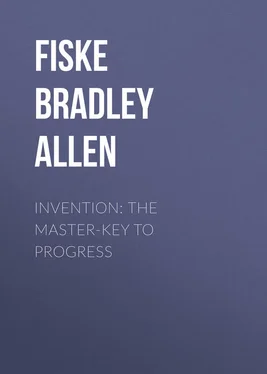Bradley Fiske - Invention - The Master-key to Progress
Здесь есть возможность читать онлайн «Bradley Fiske - Invention - The Master-key to Progress» — ознакомительный отрывок электронной книги совершенно бесплатно, а после прочтения отрывка купить полную версию. В некоторых случаях можно слушать аудио, скачать через торрент в формате fb2 и присутствует краткое содержание. Жанр: foreign_antique, foreign_prose, на английском языке. Описание произведения, (предисловие) а так же отзывы посетителей доступны на портале библиотеки ЛибКат.
- Название:Invention: The Master-key to Progress
- Автор:
- Жанр:
- Год:неизвестен
- ISBN:нет данных
- Рейтинг книги:4 / 5. Голосов: 1
-
Избранное:Добавить в избранное
- Отзывы:
-
Ваша оценка:
- 80
- 1
- 2
- 3
- 4
- 5
Invention: The Master-key to Progress: краткое содержание, описание и аннотация
Предлагаем к чтению аннотацию, описание, краткое содержание или предисловие (зависит от того, что написал сам автор книги «Invention: The Master-key to Progress»). Если вы не нашли необходимую информацию о книге — напишите в комментариях, мы постараемся отыскать её.
Invention: The Master-key to Progress — читать онлайн ознакомительный отрывок
Ниже представлен текст книги, разбитый по страницам. Система сохранения места последней прочитанной страницы, позволяет с удобством читать онлайн бесплатно книгу «Invention: The Master-key to Progress», без необходимости каждый раз заново искать на чём Вы остановились. Поставьте закладку, и сможете в любой момент перейти на страницу, на которой закончили чтение.
Интервал:
Закладка:
The Egyptians excelled in architecture, and the greatest of their buildings were the pyramids. As to whether or not there was much invention devoted to those works, it is virtually impossible now to know. The probability seems to be that they could not have been produced without the promptings of the inventor, but that the progress was a slow and gradual march. It seems that there was a long series of many small inventions that made short steps, and not a few basic inventions that proceeded by great leaps.
The Egyptians seem to have been the inventors of arithmetic and geometry. What men in particular should most be credited with inventing them, we do not know; but that some men were the original inventors the probabilities seem to intimate. For these sciences were creations just as actual as the steam engine, and could hardly have been produced save by similar procedures.
The suggestion may here be made that whatever we do is the result (or ought to be) of a decision to do it, that follows a mental process not very different from that invented by the German General Staff for solving military problems. By this process one writes down —
1. The mission – the thing which it is desired to accomplish.
2. The difficulties in the way of accomplishing it.
3. The facilities available for accomplishing it.
4. The decision – that is, how to employ the facilities to overcome the difficulties and accomplish the mission.
In solving a military problem (or in solving many of the problems of daily life) it is often a matter of great difficulty to arrive at a clear understanding of what the mission actually is, what one really wishes to accomplish. In the majority of ordinary cases, however, the mission stands out as a clear picture in the mind. Such a case would be one in which an enemy were making a direct attack; for the mission would be simply to repel it. Another case would be one in which the mission was stated by the terms of a problem itself; for instance, to build a steam engine to develop 1000 horse power. In the case of the inventor, the mission seems to be sent to him as a mental picture; he suddenly sees a dim picture in his mind of something that he must make.
Perhaps, many centuries ago, some man who had been laying out plots of ground in Egypt, of different shapes and sizes, and making computations for each one, suddenly saw a phantom picture in which all the lines and figures appeared grouped in a few classes, and arranged in conformity to a few fixed rules. The mission was given to him free, but it devolved on him to formulate the rules. As soon as he had formulated and proved the rules, the science of Geometry existed.
It is interesting to note that the conception of the idea required no labor on the part of the conceiver. He was virtually a passive receiver. His labor came afterwards, when he had to do the constructive work of "giving to airy nothing a local habitation and a name."
The Egyptians seem to have learned the use of many drugs, though they can hardly be said to have invented a system or a science of medicine. They did, however, invent a system of characters for indicating the weights of drugs. Those characters are used by apothecaries still.
The first means of cure were incantations that evidently influenced the mind. It is interesting to note that modern systems tend to decrease the use of drugs and increase that of mental suggestion.
Both the Babylonians and the Egyptians held religious beliefs; but it is doubtful if the religious beliefs of either were so definite and formulated that they could be correctly called religions, according to our ideas of what constitutes a religion. An interesting fact is the wide difference between the beliefs of the two peoples, in view of the similarity of many of the other features of their civilizations. The beliefs of neither can be called highly spiritual; but of the two, the Egyptian seems to have been the more so. The Egyptians believed that the souls of those who had lived good lives would be rewarded; while the Babylonian belief did not include even a judgment of the dead.
One of the most important inventions made in Babylonia was that of a code of laws. It is usually ascribed to a king named Hammurabi; but whether he was the real inventor or not, we have no means of knowing. We do know, however, that the first code of laws of which there is any record was invented in his reign, and that it was the prototype of all that have followed since.
The influence on history of the invention and carrying into effect of a formulated code of laws, we cannot exactly gauge; but we may assert with confidence that modern civilization would not have been possible without codes of laws, and that the first code must have been more important than any code that followed, because it led the way.
Both the Babylonians and the Egyptians seem to have made most of their inventions in the period of their youth, and to have become conservative as they grew older. The Babylonians were a great people until about the year 1250 B. C., when a subject city, Assur, in the north, threw off its allegiance and formed an independent state, Assyria. The decline of Babylonia continued until the fall of Assyria and the destruction of Nineveh, its capital, about the year 606 B. C., when the new Babylonian, or Chaldean Empire, came into existence. It enjoyed a period of splendid but brief prosperity until it was captured by Cyrus, king of Persia, in the year 538 B. C.
Egypt's career continued until a later day; but it was never glorious in statesmanship, war or invention, after her youth had passed.
A nation possibly as old as the Babylonian or Egyptian was the Chinese; but of their history, less is known. It is well established, however, that they possessed a system of picture writing in which each word was represented by a symbol. The system was much more cumbrous, of course, than the syllabic or alphabetical; but its invention was a performance, nevertheless, of the utmost brilliancy and importance, viewed from the light of what the world was then. There is little doubt also that the Chinese were the original inventors of the magnetic compass and of printing from blocks, two of those essential inventions, without which civilization could not have been brought about. Another of China's inventions was gunpowder; though it is not clear that the Chinese ever used it to propel projectiles out of guns.
Achievements equally great, and maybe greater, were the creations of religions – Confucianism and Taoism, invented in China, and Buddhism, invented in India. These religions may seem to us very crude and commonplace and earthy; but we should not shut our eyes to the fact that they have probably influenced a greater number of human beings toward right living than any other three religions that we know of.
Like Babylonia and Egypt, China became conservative as she grew older. At the present day, her name stands almost as the symbol of everything non-progressive and non-inventive.
Assyria was able to capture Babylon about the year 1250 B. C., and to maintain the position of the dominant power in western Asia for about 600 years. A progressive and ambitious people, they accomplished an original and important step in the art of government by organizing conquered peoples into provinces under governors appointed by the king. It does not seem to be a great straining of the word to declare that this achievement was so novel, so concrete and so useful as to possess the essential features of an invention. For if we realize that during all the times that had gone by, conquered peoples had remained simply conquered peoples, paying tribute but not forming parts of the conquering state, we can see that the idea of actually incorporating them into the state, thereby increasing the population of the state by the number of people incorporated, and making the state stronger in that proportion, we can hardly fail to realize that the conception of doing this was of the highest order of brilliancy. To work out afterwards the details of developing the conception in such a way as to render possible the production of an actual and workable machine of government was a constructive act. When the machine was actually produced a new thing had been created. In other words, the institution of this new scheme in government seems to have followed the same three stages as the invention of a mechanical device; that is, conception, development and production.
Читать дальшеИнтервал:
Закладка:
Похожие книги на «Invention: The Master-key to Progress»
Представляем Вашему вниманию похожие книги на «Invention: The Master-key to Progress» списком для выбора. Мы отобрали схожую по названию и смыслу литературу в надежде предоставить читателям больше вариантов отыскать новые, интересные, ещё непрочитанные произведения.
Обсуждение, отзывы о книге «Invention: The Master-key to Progress» и просто собственные мнения читателей. Оставьте ваши комментарии, напишите, что Вы думаете о произведении, его смысле или главных героях. Укажите что конкретно понравилось, а что нет, и почему Вы так считаете.












